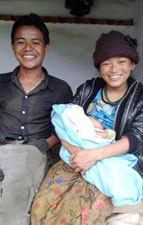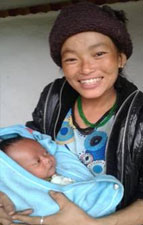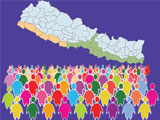Blogs
Celebration and Tragedy: Why Maternal Health Services in Remote Areas Need Strengthening
Case Study 1: Baby Limbu Survives Due to the Efforts of Lingkhim Health Post
Twenty-one year Kabila Limbu of Khejenim 3, Taplejung, eastern Nepal became pregnant for the first time in June 2014. She attended regular antenatal check-ups at her local health post at Lingkhim from the fourth month of her pregnancy after her interaction with the local social mobiliser. Her labour pains began at 5am on 19 March 2015 and her husband and in-laws took her to the birthing centre at Lingkhim Health Post.
She was admitted at midday complaining of the normal labour symptoms of lower abdominal pain, backache and vaginal discharges. I (the auxiliary nurse-midwife, ANM) found the condition of the mother and foetus to be normal. The foetal heart rate was regular at 140 beats per minute and the mother’s cervix was open at 8cm wide. She had good regular and strong contractions. My only concern was that the baby’s head was high. We closely monitored the mother and baby.
 At 4:30pm, we found the mother’s cervix to be fully dilated, but the foetus’s meconium (the
dark green faeces of the foetus) was staining the amniotic fluid in the womb indicating that the foetus could be having difficulties. So we closely observed the foetal heart sound and the mother’s condition. We waited until 7 pm, but
still the mother couldn’t push the baby down. We then took the consent of her husband and tried vacuum delivery three times, but without any success. We strongly suspected shoulder obstruction of the foetus but were unable to do anything
about it.
At 4:30pm, we found the mother’s cervix to be fully dilated, but the foetus’s meconium (the
dark green faeces of the foetus) was staining the amniotic fluid in the womb indicating that the foetus could be having difficulties. So we closely observed the foetal heart sound and the mother’s condition. We waited until 7 pm, but
still the mother couldn’t push the baby down. We then took the consent of her husband and tried vacuum delivery three times, but without any success. We strongly suspected shoulder obstruction of the foetus but were unable to do anything
about it.
At 7.30 pm we phoned the district hospital, told them about the case and were advised to bring the mother as soon as possible (the hospital lies about four hours’ drive away). It took about two frustrating hours to find a vehicle. A colleague and I accompanied the mother and husband and took along equipment to deliver the baby on the way.
At 1.40 am, after four hours drive from the health post, the mother had very strong contractions. We delivered the baby in the vehicle. He was in a bad condition looking very pale with no pulse, no reflexes and no breathing.
We wrapped him up and used a suction bulb to clear his breathing passages and an ambu bag to give him extra oxygen. The baby did not respond the first time we did suction on his mouth, resuscitation and stimulation. There was no sign of life and everybody thought he was lost. We tried a second time and eventually the baby came around and started to cry.
Everybody felt so happy as nobody had expected him to live. We gave the mother an oxytocin injection to reduce post-delivery bleeding and soon reached the district hospital and handed the mother and baby over to the care of the doctors and nurses.
A month after this difficult case and the mother and baby are healthy and we feel a strong sense of satisfaction at having saved the life of baby Limbu.
As told by Krishna Limbu, ANM, Lingkhim Health post
A large part of the credit for baby Limbu’s survival can be attributed to Taplejung District Health Office (DHO) that has improved the awareness of local communities about maternal and newborn care and the strengthening of local health facilities to provide care. The Family Health Division and the Nepal Health Sector Support Programme (NHSSP) are supporting the DHO under an ongoing initiative (RAMP) to identify the most cost-effective strategies for improving access to MNH care across Nepal’s many remote areas.
For the first few months of her pregnancy Kabila was not getting antenatal checkups nor was she taking the recommended iron-folic acid supplements. She started attending RAMP’s MNH awareness sessions at her local mother’s health group in October 2014. This convinced her to go for ANC checkups, take iron supplements and deliver at a health facility. She also took part in a husband-wife interaction that improved her husband’s understanding about pregnancy danger signs and the support that Kabila needed. These awareness raising activities were run by the local NGO the Nepal Women’s Entrepreneurs Association.
In 2014/15 the DHO has had considerable success in strengthening the MNH services provided at several health posts in remote areas of Taplejung (including Lingkhim Health Post). The ANM Krishna has recently attended an SBA refresher course, and the DHO provided intensive support for maintaining the necessary equipment and supplies to deal with complicated births. These improvements and the ANM’s strengthened links with the district hospital for referring cases played a huge role in saving baby Limbu’s life.
Case Study 1: Baby Limbu Survives Due to the Efforts of Lingkhim Health Post

Twenty-one year Kabila Limbu of Khejenim 3, Taplejung, eastern Nepal became pregnant for the first time in June 2014. She attended regular antenatal check-ups at her local health post at Lingkhim from the fourth month of her pregnancy after her interaction with the local social mobiliser. Her labour pains began at 5am on 19 March 2015 and her husband and in-laws took her to the birthing centre at Lingkhim Health Post.
She was admitted at midday complaining of the normal labour symptoms of lower abdominal pain, backache and vaginal discharges. I (the auxiliary nurse-midwife, ANM) found the condition of the mother and foetus to be normal. The foetal heart rate was regular at 140 beats per minute and the mother’s cervix was open at 8cm wide. She had good regular and strong contractions. My only concern was that the baby’s head was high. We closely monitored the mother and baby.
 At 4:30pm, we found the mother’s cervix to be fully dilated, but the foetus’s meconium (the
dark green faeces of the foetus) was staining the amniotic fluid in the womb indicating that the foetus could be having difficulties. So we closely observed the foetal heart sound and the mother’s condition. We waited until 7 pm, but
still the mother couldn’t push the baby down. We then took the consent of her husband and tried vacuum delivery three times, but without any success. We strongly suspected shoulder obstruction of the foetus but were unable to do anything
about it.
At 4:30pm, we found the mother’s cervix to be fully dilated, but the foetus’s meconium (the
dark green faeces of the foetus) was staining the amniotic fluid in the womb indicating that the foetus could be having difficulties. So we closely observed the foetal heart sound and the mother’s condition. We waited until 7 pm, but
still the mother couldn’t push the baby down. We then took the consent of her husband and tried vacuum delivery three times, but without any success. We strongly suspected shoulder obstruction of the foetus but were unable to do anything
about it.At 7.30 pm we phoned the district hospital, told them about the case and were advised to bring the mother as soon as possible (the hospital lies about four hours’ drive away). It took about two frustrating hours to find a vehicle. A colleague and I accompanied the mother and husband and took along equipment to deliver the baby on the way.
At 1.40 am, after four hours drive from the health post, the mother had very strong contractions. We delivered the baby in the vehicle. He was in a bad condition looking very pale with no pulse, no reflexes and no breathing.
We wrapped him up and used a suction bulb to clear his breathing passages and an ambu bag to give him extra oxygen. The baby did not respond the first time we did suction on his mouth, resuscitation and stimulation. There was no sign of life and everybody thought he was lost. We tried a second time and eventually the baby came around and started to cry.
Everybody felt so happy as nobody had expected him to live. We gave the mother an oxytocin injection to reduce post-delivery bleeding and soon reached the district hospital and handed the mother and baby over to the care of the doctors and nurses.
A month after this difficult case and the mother and baby are healthy and we feel a strong sense of satisfaction at having saved the life of baby Limbu.
As told by Krishna Limbu, ANM, Lingkhim Health post
A large part of the credit for baby Limbu’s survival can be attributed to Taplejung District Health Office (DHO) that has improved the awareness of local communities about maternal and newborn care and the strengthening of local health facilities to provide care. The Family Health Division and the Nepal Health Sector Support Programme (NHSSP) are supporting the DHO under an ongoing initiative (RAMP) to identify the most cost-effective strategies for improving access to MNH care across Nepal’s many remote areas.
For the first few months of her pregnancy Kabila was not getting antenatal checkups nor was she taking the recommended iron-folic acid supplements. She started attending RAMP’s MNH awareness sessions at her local mother’s health group in October 2014. This convinced her to go for ANC checkups, take iron supplements and deliver at a health facility. She also took part in a husband-wife interaction that improved her husband’s understanding about pregnancy danger signs and the support that Kabila needed. These awareness raising activities were run by the local NGO the Nepal Women’s Entrepreneurs Association.
In 2014/15 the DHO has had considerable success in strengthening the MNH services provided at several health posts in remote areas of Taplejung (including Lingkhim Health Post). The ANM Krishna has recently attended an SBA refresher course, and the DHO provided intensive support for maintaining the necessary equipment and supplies to deal with complicated births. These improvements and the ANM’s strengthened links with the district hospital for referring cases played a huge role in saving baby Limbu’s life.




